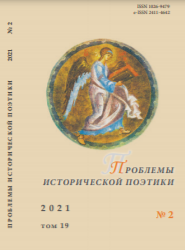Утопия как антиутопия (повесть Андрея Платонова «Хлеб и чтение»)
Utopia as an Anti-Utopia (Andrey Platonov's Short Novel Bread and Reading)
Author(s): Marina Vladimirovna ZavarkinaSubject(s): Studies of Literature, Recent History (1900 till today), Russian Literature
Published by: Петрозаводский государственный университет
Keywords: A. Platonov; “Bread and Reading”; short novel; “Technical Novel”; utopia; anti-utopia; dystopia; cacotopia; metautopia; creative strategy;
Summary/Abstract: The article analyzes A. Platonov's short novel Bread and Reading, which is the first part of an unfinished trilogy called Technical Novel. Different approaches to the analysis of the writer's anti-utopian strategy are considered, and certain terms related to the intra-genre typology of his works, which are still the subject of controversy in Platonov studies, i.e., utopia, anti-utopia, metautopia, dystopia, and cacotopia are clarified. The article offers a new perspective on this problem and concludes that the short novel is characterized by a complex conflict between utopia and anti-utopia, namely, utopian consciousness is embodied in the form of anti-utopia, which leads to the ambivalence in meaning and the appearance of internal antinomies. This mainly revealed in the title of the short novel, the epigraph, a special type of plot situation and the character system structure. Platonov's work is characterized not only by the problem of the relationship between man and nature, but also that of between man and technology, which becomes a part of the anthropological worldview and acquires human features. Platonov's characters dream of a time when technology, nature and man are in a harmonious relationship, helping each other overcome universal entropy. The motif of construction sacrifice, traditional in the poetics of Platonov's works, plays an important role in the short novel: it is premature and shameful to think about personal happiness in the world of socialism that has not yet been built, without enough “bread and reading.” The work reflects Platonov's own hopes and doubts, and if the “principle of hope” (E. Bloch) is the main principle of utopian consciousness, then the writer's doubt becomes the main feature of his anti-utopia strategy. On the one hand, this makes it difficult to identify the genre of the short novel Bread and Reading (utopia or anti-utopia), on the other, it does not lead to an “imbalance” of forces, but, rather, to a meek awareness of the place of man in the world and his limited capabilities. An important role is also played by the fact that The Juvenile Sea was supposed to become the second part of the trilogy, and Dzhan may have made up the third part: the three works not only complement, but also “explain” each other. In the finale of Bread and Reading, the characters remain focused on the “distant,” as they stay in the same utopian dream space. Likely never having found a way out of the “impasse of utopia,” Platonov leaves Technical Novel unfinished.
Journal: Проблемы исторической поэтики
- Issue Year: 19/2021
- Issue No: 2
- Page Range: 326-352
- Page Count: 27
- Language: Russian

